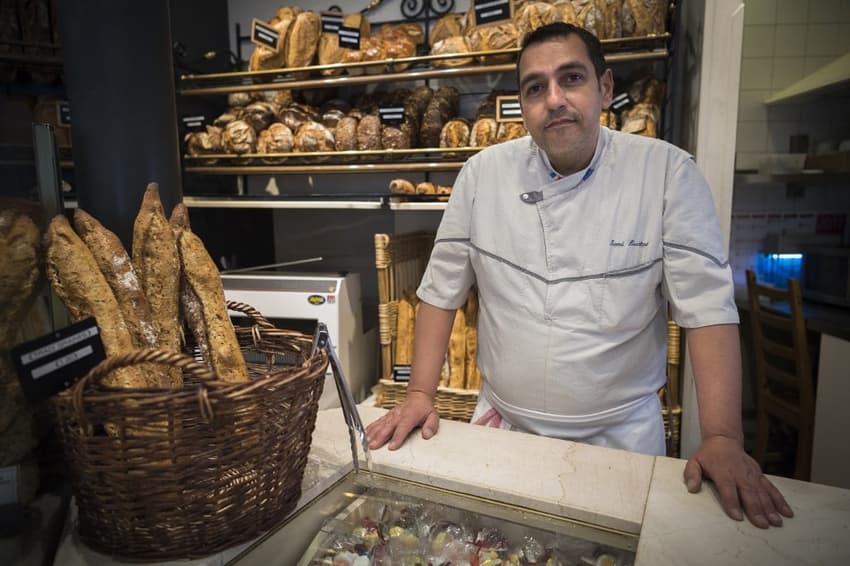French dilemmas: Is your daily bread a normal baguette or the 'tradition' version?

It's so ingrained in the country's DNA that it is now seeking Unesco World Heritage status - but are people moving away from the basic baguette?
We asked readers of The Local whether they order a baguette or a tradition when they visit their local boulangerie, and the tradition scored a significant victory.
READ ALSO
Living in France: Daily dilemmas. So wandering around with a loaf of bread under your arm is practically compulsory in France - but do you prefer a Baguette or a Tradition?
— The Local France (@TheLocalFrance) July 29, 2019
But they're both long, thin sticks of bread, so what is the difference between the two?
Well as the name suggests, the tradition must be made using the traditional methods, while a baguette can include extra ingredients.
A tradition must be made using only flour, yeast, salt and water - the recipe specified in the French government's 'bread decree' of 1993.
It was at this point that the tradition was born, as bakers used the name to indicate that their loaf was made in the traditional manner, and does not contain any additives or preservatives.
The bread decree specifies that if any extra ingredients like grains, cereals or nuts - or any chemical additives or preservatives - are added, the resulting product cannot call itself a tradition.
Calling a bread that contains more than the specified four ingredients a tradition could be regarded as a 'misleading business practice' by inspectors from the Départementale de la Protection des Populations.
The reason for this is that a tradition, like products that have the artisan designation, tends to be more expensive, although its usually only a matter of an extra 10c or so.
The bread decree of 1993 is one of many ways that French bakers are seeking to protect the quality of their products from inferior imitations.
In 2017 one French baker launched an effort to get a 'tradition' mark for the croissant after complaining that too many boulangeries were buying in their croissants from factories.
According to Frederic Roy, from Nice, a traditional croissant should be made on the premises and use French butter and additive-free flour.
The move to give the baguette (and that's the baguette de tradition) Unesco status, which is currently being considered, is also a move to protect the quality of French bread products.
Launching the bid, Dominique Anract, head of the national federation of bakers, said: "A baguette is the symbol of France, like the Eiffel Tower. I want to fight for world heritage status to protect the quality of the traditional baguette.
"When I see the the growing dominance of French supermarkets and convenience stores in the sale of bread, I say to myself that we must act. Hence my desire to push for the addition of the traditional French baguette to Unesco's list of Intangible World Heritage."
"Today, there are 33,000 artisan bakeries, employing 180,000 people, who serve bread all over France. This territorial network is unique throughout the world, we must not lose it."
Comments
See Also
We asked readers of The Local whether they order a baguette or a tradition when they visit their local boulangerie, and the tradition scored a significant victory.
READ ALSO
Living in France: Daily dilemmas. So wandering around with a loaf of bread under your arm is practically compulsory in France - but do you prefer a Baguette or a Tradition?
— The Local France (@TheLocalFrance) July 29, 2019
But they're both long, thin sticks of bread, so what is the difference between the two?
Well as the name suggests, the tradition must be made using the traditional methods, while a baguette can include extra ingredients.
A tradition must be made using only flour, yeast, salt and water - the recipe specified in the French government's 'bread decree' of 1993.
It was at this point that the tradition was born, as bakers used the name to indicate that their loaf was made in the traditional manner, and does not contain any additives or preservatives.
The bread decree specifies that if any extra ingredients like grains, cereals or nuts - or any chemical additives or preservatives - are added, the resulting product cannot call itself a tradition.
Calling a bread that contains more than the specified four ingredients a tradition could be regarded as a 'misleading business practice' by inspectors from the Départementale de la Protection des Populations.
The reason for this is that a tradition, like products that have the artisan designation, tends to be more expensive, although its usually only a matter of an extra 10c or so.
The bread decree of 1993 is one of many ways that French bakers are seeking to protect the quality of their products from inferior imitations.
In 2017 one French baker launched an effort to get a 'tradition' mark for the croissant after complaining that too many boulangeries were buying in their croissants from factories.
According to Frederic Roy, from Nice, a traditional croissant should be made on the premises and use French butter and additive-free flour.
The move to give the baguette (and that's the baguette de tradition) Unesco status, which is currently being considered, is also a move to protect the quality of French bread products.
Launching the bid, Dominique Anract, head of the national federation of bakers, said: "A baguette is the symbol of France, like the Eiffel Tower. I want to fight for world heritage status to protect the quality of the traditional baguette.
Join the conversation in our comments section below. Share your own views and experience and if you have a question or suggestion for our journalists then email us at [email protected].
Please keep comments civil, constructive and on topic – and make sure to read our terms of use before getting involved.
Please log in here to leave a comment.